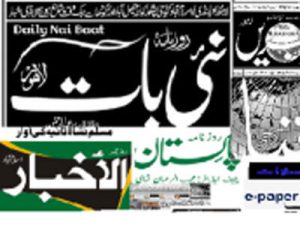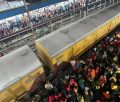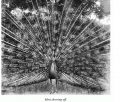Pak Urdu Media Digest – Dec 4, 2023
8 Min

- Jamaat e Islami Amir Siraj ul Haq has said that the next election will be about getting rid of the interest-based economic system. Addressing a press conference in Mansurah, he said people were cheated in the name of Roti, Kapda and Makan. The system has been the same for the last 70 years. The next election will be about freedom from oppression and exploitation. His party campaign will be started from Dec 8. Only Jamaat e Islami can give a corruption-free Pakistan. He said that today the common man is worried, and the whole country is stuck in the swamp. We have to change the system, not the faces. (Qudrat Daily)
- Addressing a press conference in Mansurah, Jamaat e Islami chief Sirajul Haq said that the people were cheated in the name of bread, cloth and house. The system has been the same for the last 70 years, only the faces have changed. It is not possible for the election to be between the favorite and the Super favorite. The governments in the last 10 years are the name of continuity, not of any revolution. Even today, corruption continues and darkness reigns in the country. The former rulers only increased their bank balances, nothing for the people. The next election will be about freedom from tyranny and oppression. We want inflation and poverty to end. (Roznama Intekhab)
- Yet another incident of looting by police and sensitive organizations has come to light in Karachi. People in plain clothes kidnapped a citizen Yasir and demanded Rs.12.20 lakh ransom. The incident happened on the night of October 16 in Mahmoodabad Ashraf Colony. The affected citizen said that 8 to 10 armed men in plain clothes entered his house and introduced themselves first as police officers, and then in the name of various sensitive organizations. These intruders searched my house, but nothing was found. So, they took me in my car to my office, and kept demanding money while searching the office. When they didn’t find anything in the office also, they drove me around Shaara Faisal. These plain clothes people transferred Rs.10 lakh from my account online and took Rs.2.20 lakh in cash. And dropped me near FTC Bridge. Police have registered a case but even after the passage of one and a half months, the abductor police party has not been traced and arrested. (Jang)
- Two officers of the Levies Force, Qasim and Ubaidullah, were killed during an exchange of fire with the criminals in the Killi Marjanzai area of Loni. The Levies Force raided the house of the accused Amanullah Marjanzai and during this raid there was an exchange of fire with the accused. Later, the Kohlu Levies Force conducted an operation and arrested four criminals. (Qudrat Daily)
- It is strange that our law keeping machinery was unaware when dacoits were gunning down 13 persons from four different tribes including Solangi, Shur, Selra and Kosh at Mashko, in an area falling between Sindh-Punjab two days ago. It is learnt very dangerous weapons were used in the exchange of fire. If law keeping machinery continues ignoring tribal-related issues and clashes, then coming generations will pay heavy price. There is no part of Sindh that is not affected in these kabila issues. On the one hand, sardars and kabila heads are dominating Sindh society and on the other hand, police and law keeping machinery who have to protect people, have become yes-men of these sardars and kabila heads. The areas where kabila clashes take place, have big heaps of modern weapons. Where do these heavy and sophisticated weapons come and how do they reach different parts in Sindh? Surprisingly, how these sophisticated weapons cross police outposts to reach different parts in Sindh reflect on the inefficiency and failure of law keeping machinery and police force. The incidents like one at Mashko can keep taking place if police and law keeping authorities keep playing facilitators’ role for supply of these weapons. (Ismail Langa in Awami Awaz, Dec.2)
- In the last few months, law enforcement personnel have been targeted in several terrorist incidents, but unlike in the past, the terrorist attacks have been carried out not by the outlawed Tehreek-e-Taliban Pakistan (TTP). Small outfits have claimed responsibility for these attacks. They include Lashkar-e-Khorasan, Tehreek-e-Jihad Pakistan, and the group of militant commander Hafiz Gul Bahadur which are not known. In November, there were a total of 63 terrorist incidents, a 34 percent increase. As many as 37 law enforcement officers were killed. The terrorist involved in the suicide attack in the Bakakhel area of Bannu on November 26, 2023 is also said to be linked to Hafiz Gul Bahadur’s group. According to ISPR, the spokesperson of the Pakistan Army, the attacker was a citizen of Afghanistan and two civilians were killed in the attack while ten people including three security personnel were injured. This is not the first attack; militants of Hafiz Gul Bahadur group have been directly involved in terrorist incidents earlier also. After the occupation of Afghanistan by the Taliban on August 15, 2021, there has been a continuous increase in the operations of this group in the southern districts of Khyber Pakhtunkhwa. The attack in Bannu comes at a time when Pakistan has been repeatedly demanding the Afghan government to take concrete action against the TTP and other militants on the Afghan soil. Pakistan claims that it has provided Kabul with evidence of Afghan soil being used against Pakistan, while the Afghan Taliban say that Pakistan should itself handle its internal law and order situation. Afghan Taliban spokesman Zabihullah Mujahid has repeatedly denied allegations of use Afghan soil for attacks on Pakistan. In August 2023, he said that Afghanistan has come to peace after a long war and the Kabul government does not interfere in any other country. In the past eighteen members of ISIS have been killed in Afghanistan, who belonged to Pakistan, but the Afghan Taliban did not make such an accusation against Pakistan. During an exchange of statements based on allegations between the government of Pakistan and the Afghan Taliban, Sufyan Karwan of the Hafiz Gul Bahadur group claimed responsibility for the August 31 suicide attack on security forces. To know how strong the network of Hafiz Gul Bahadur group is in Pakistan, it is important to know about Hafiz Gul Bahadur himself. It should also be understood that how this group is connected with Afghan Taliban and TTP. Hafiz Gul Bahadur belongs to Datta Khel area of North Waziristan. He received his religious education from Darul Uloom Nizamiya Madrasa (in Mir Ali Tehsil) after which he became the finance secretary of Jamiat Ulema Islam students’ organization and later its press secretary. Nasir Dawar, a senior journalist from North Waziristan, has had several interviews with Hafiz Gul Bahadur. According to him, Gul Bahadur was not only ideologically influenced by the Afghan Taliban, but he was also close to the Afghan Taliban. “Hafiz Gul Bahadur participated to some extent in the fighting with the Afghan Taliban against the Northern Alliance. But when the United States came to Afghanistan after 9/11, his jihadi engagements increased. He was active in helping and meeting the main Afghan Taliban leaders in North Waziristan.” According to Nasir Dawar, Gul Bahadur’s contacts in North Waziristan were established with the Haqqani network and later with Al-Qaeda, and when operations against terrorism began in North Waziristan, he formed ‘Shura Mujahideen Waziristan’ to fight in Pakistan and Afghanistan. A suicide training camp was also run under the auspices of his group in Datta Khel. It should be noted that the highest number of drone attacks in Pakistan took place in Datta Khel Tehsil of North Waziristan and the burial of dead foreign fighters also continued in Datta Khel. The Hafiz Gul Bahadur Group provided the bulk of the manpower for the “Torah Shipa” i.e., the Black Night Death Squad for targeted killing of those identifying the targets for the drone strikes. This squad included fighters from different organizations. Commander Hafiz Gul Bahadur’s targets were in Afghanistan while the TTP remained active mostly in Pakistan. So, Commander Hafiz Gul Bahadur maintained contacts with the TTP but avoided formal involvement. Rifaatullah Orakzai, a well-known analyst closely observing these issues, believes that Hafiz Gul Bahadur has been avoiding directly challenging the Pakistani state. Speaking to Voice of America, Rifatullah Orakzai said that Gul Bahadur has been part of the coalition of various factions of Mujahideen and the general perception about him was that he was a pro-government commander. When the TTP was formed, he preferred his own separate identity and this strategy was quite successful. The North Waziristan administration had signed an agreement with the group in September 2006 to curb the activities of commander Hafiz Gul Bahadur. The agreements in Waziristan would have specifically stipulated that no fighters would be sent from North Waziristan to Afghanistan. But the conditions mentioned in the agreement was hardly followed. In June 2014, Pakistani security forces launched ‘Operation Zarb-e-Azb’ indiscriminately against all groups present in North Waziristan. Hafiz Gul Bahadur, like other militant groups, crossed the Pak-Afghan border and took shelter in Khost province of Afghanistan. The Hafiz Gul Bahadur group remained very active even while in Afghanistan. The elders of North Waziristan held several meetings with Hafiz Gul Bahadur in Liman area of Paktika province of Afghanistan. According to journalist Nasir Dawar, while living in Afghanistan, Hafiz Gul Bahadur’s contacts with the outlawed TTP became stronger. Negotiations with Hafiz Gul Bahadur failed as he has taken extreme position. Commander Hafiz Gul Bahadur’s group is of particular importance with its long experience of fighting in the region and association with Haqqani network, Al-Qaeda, TTP and Afghan Taliban. Hafiz Gul Bahadur is generally considered to be part of the Haqqani network. This impression is also because the centers of the Haqqani network were in North Waziristan where Hafiz Gul Bahadur supported them at all levels. As Hafiz Gul Bahadur belongs to the Madakhil sub-branch of the Wazir tribe, most of the fighters from the same tribe located on the Pak-Afghan border are a part of his group. Local sources said that in March 2011, more than forty people were killed in a drone attack on a jirga held regarding the ownership of chromite. Commander Hafiz Gul Bahadur was reported to be in this jirga, but he was not present on the occasion. After 2014, a good number of Afghan fighters joined the Hafiz Gul Bahadur group. Sadr Hayat from Jani Khel, Mufti Sadiq Noor and Siddiqullah from the Dawar tribe are included in their main council. (Syed Fakhar Kakhkhel, Urdu Voice of America)
- Inflation is increasing with each passing day in Pakistan. It is a pity that no measures are taken by the government to control inflation. People are getting frustrated. Now not a day goes by when the prices of food items do not increase. The free manner in which the d profiteers are increasing the prices is a question mark on the efficiency of the government. Life has become a burden for the common people and they are waiting for a messiah. Pakistan is a developing country. More than 40% of the population here is forced to live below the poverty line. Before the angry people take to the streets, fed up with the situation, the rulers should come to their senses and provide relief to the public as much as possible. (Edit, Daily Khabrain)
- There is no doubt that the real and self-inflicted inflation has made life miserable for the people. Price of gas increased by 520% and electricity by 34.95% year-on-year in November, due to which overall inflation reached 29.2%. Inflation of basic necessities i.e., food items touched 29.8% in urban areas and 29.2% in rural areas, while non-food inflation was 30.9% in urban areas and 25.9% in rural areas. The highest year-on-year price increases were observed in respect of spices, wheat flour, rice, pulses, tea, jaggery, sugar, beverages, beans and potatoes. In the non-food category rates have gone up for textbooks, stationery, soap, washing powder, matches, communication devices, household appliances, and medicines. There is no doubt that whenever oil, gas, electricity and the dollar are expensive the all-out inflation affects the whole society. When the same things are cheap, inflation does not decrease. In our country, self-inflation is real and a big problem, once something becomes expensive, then its price does not decrease. For example, if oil becomes cheap, the transport fares do not decrease. If the government cannot give subsidies, then it should at least end the self-made inflation. The thing to remember is what the World Bank is saying: “Pakistan has to decide that it will adopt tough policies based on tough decisions for a brighter future, or it will follow the path of the past”. We have to stop the luxury of the elite and divert the resources to the people that this is the only way of our survival. (edit in Jang) ####
-
Book Shelf
-
 Book Review
DESTINY OF A DYSFUNCTIONAL NUCLEAR STATE
Book Review
DESTINY OF A DYSFUNCTIONAL NUCLEAR STATE
- Book ReviewChina FO Presser Where is the fountainhead of jihad?
- Book ReviewNews Pak Syndrome bedevils Indo-Bangla ties
- Book Review Understanding Vedic Equality….: Book Review
- Book Review Buddhism Made Easy: Book Review
- Book ReviewNews Elegant Summary Of Krishnamurti’s teachings
- Book Review Review: Perspectives: The Timeless Way of Wisdom
- Book ReviewNews Rituals too a world of Rhythm
- Book Review Marx After Marxism
- Book Review John Updike’s Terrorist – a review
-
-
Recent Top Post
-
 CommentariesTop Story
India’s Migration Dilemma
CommentariesTop Story
India’s Migration Dilemma
-
 Commentaries
Crowd Management Blues
Commentaries
Crowd Management Blues
-
 Meher Baba SpeaksNews
Meher Baba Loved Them Too…
Meher Baba SpeaksNews
Meher Baba Loved Them Too…
- Commentaries Record Pentagon spending bill and America’s hidden nuclear rearmament
-
 CommentariesNews
Ides of trade between India and Pakistan
CommentariesNews
Ides of trade between India and Pakistan
-
 Commentaries
How sustainable is the rhetoric of India-China Bhai-Bhai
Commentaries
How sustainable is the rhetoric of India-China Bhai-Bhai
-
 CommentariesTop Story
New Set of Diplomatic Strains with Canada
CommentariesTop Story
New Set of Diplomatic Strains with Canada
-
 News
Ratan Tata’s Legacy
News
Ratan Tata’s Legacy
-
 Commentaries
India’s Strategic Push on the World Stage
Commentaries
India’s Strategic Push on the World Stage
- Commentaries Veils of Resistance
-
AdSense code
















